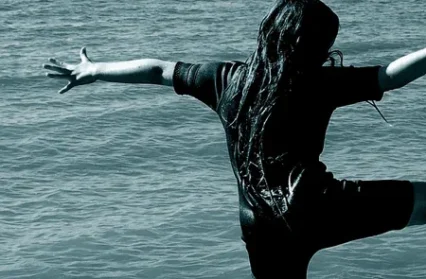In this new series, Poetry Editor Carl Griffin, looks at three outstanding poets that are all connected in some way. He begins with three connected by country.
~
Jemma L King is the youngest of these three Welsh poets, and only has one collection to her name (The Shape of a Forest, published by Parthian). Still, King, a teacher of literature and creative writing at Aberystwyth University, and a founding member of the Centre for Women, Writing and Literary Culture, is an adventurous poet. Here, she time-travels between now and the late 1950s, staying in the same bar in both centuries. In 1959, there was Ted Hughes and Sylvia Plath. The pub is the Stubbing Wharf, which was the setting of the poem ‘Stubbing Wharfe’ by Ted Hughes, published in Birthday Letters. The pub has changed a lot from the grim and smoky place it was then, and you wont get a better representation of that change than King’s ‘Stubbing Wharf’ (no ‘e’):
Stubbing Wharf (no ‘e’)
The hunt was on for his
‘gummy dark bar’,
his street ‘sweating black’
with future forking choices.
An angry, pregnant wife.
I’ll admit to expecting 1959.
I saw her swaddled
in new synthetics, choking
the corner in a swelling sulk, tightly
framing her rum with
homesick paws.
And him, the wounded dog, pouting
at her lack of love
for sooty poetic edges, looking
for the answers
in that Guinness of his.
I employed the extras of
pipe smoking old man
and hound.
Fireside and damp
fluey carpet,
threadbare, overpatterned,
dulled on the heel
of tarred pit boots.
But instead of the frothy
static of this scene,
a sun bleached pub garden
crashed in on me. A swinging
shining sign, and the benign
packed yard of
business lunchers. The ghosting presence
of flying texts and emails,
children bouncing missiles diffusing at will, mums
scrolling downloadable menus.
‘Always the warmest welcome’
the website says.
What it doesn’t say is
that the particles
have been rooted out,
blasted
with the thunder roll of decades,
collapsing into
new fads, colours.
As I sat, shoulder to shoulder
with strangers, strong armed
and pinioned by the lock
of wooden benches,
I knew then,
that they were no more here,
than in my own
front room,
or head.
Their minutes
bracketed off,
cordoned
in print.
~
Veteran poet Sheenagh Pugh lives in Shetland but is originally from Wales. Her next collection Short Days, Long Shadows, is due to be published in June, by Seren. Pugh used to teach Creative Writing at the University of Glamorgan, and still visits Cardiff, regularly, where she used to live. She often uses poetry to commemorate people and places, and Cardiff this time is the place. And the person? Well, get to know him for yourself:
Terra Nova
Cardiff Bay: 23rd May 2008
We’d taken him there for his birthday
– his last, as things turned out.
The Bay was new territory
to him (‘getting the bus these days
feels like an expedition’)
but he took to the place,
sipping red wine, chewing steak
slowly and thoughtfully, watching
swans, yachts, the crazy wake
of the ribs zipping to and fro
in the pleasure-lake that once
was a coal port. Sun at the window
ironed out his face. The hazy barrage
pleased him, and the herons,
and the sailors’ church,
though he couldn’t walk as far
as the man of ice,
the white mosaic sculpture
that marks the fool’s errand
of a ship leaving safe harbour
to seek the world’s end.
~
John Barnie was born and raised in the market town of Abergavenny. Previously editor of the influential cultural magazine, Planet, he is now a freelance writer. He lives and works in Aberystwyth, although he lived in Denmark for over a decade, mainly during the ’70s. His latest collection is The Roaring Boys, published by Cinnamon Press. Even religious people can enjoy the humour of ‘APE HOUSE COMPLETE’, a poem which, on the face of it, says there is no God, only us. The beauty and joy in this poem will, to some, imply the opposite. But hey, just consider how you look first thing in the morning then read this:
APE HOUSE COMPLETE
Orang-utans whose hair is badly henna’d,
whose eyes are the opium dreamer’s eyes
that say if this is dreaming why dream at all
and gorillas, black leather-men hanging out
in a concrete box, who have never used their power
and cannot understand the colour green
and chimpanzees, after all, chimpanzees
are always funny, seen doing comic cuts on film
knuckle-walking into the laughter of the crowd
but in every ape house where I’ve been
H. sapiens is missing, not even a start-up family
whose offspring could be passed to other zoos
‘Daddy, come and see the humans’
and study the eyes as they glance up from a fridge
or close when copulating on a well-sprung bed.











